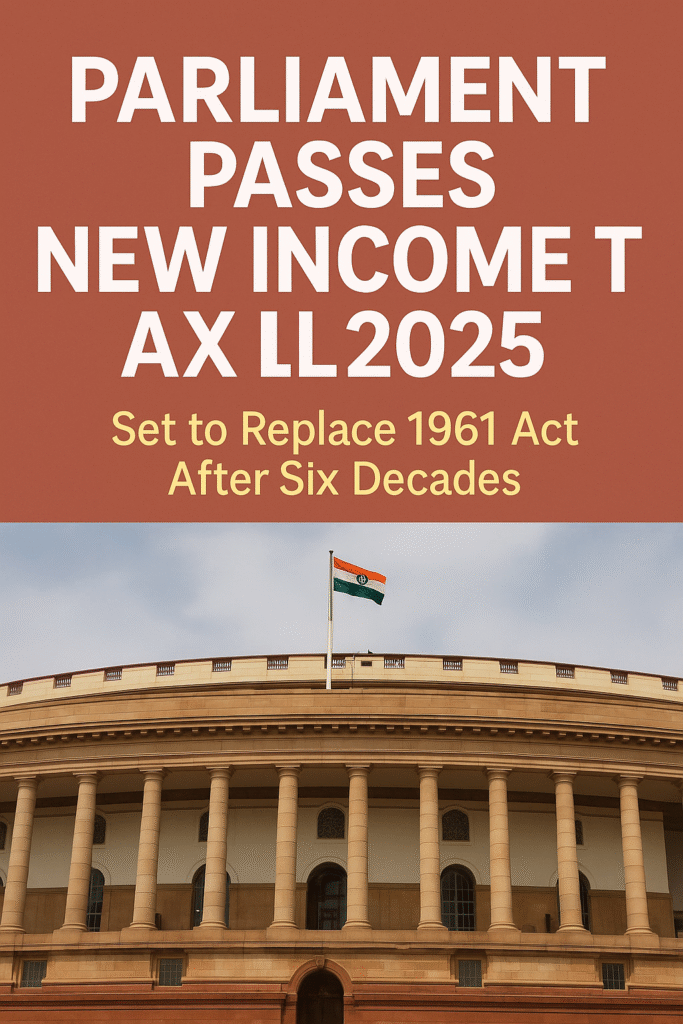Parliament Passes New Income Tax Bill 2025: – In a landmark decision, India’s Parliament has passed the Income Tax Bill, 2025, marking the beginning of a new era in the country’s taxation system. This bill is set to replace the Income Tax Act of 1961 after more than six decades, with the aim of simplifying, modernising, and making tax compliance more transparent for citizens. The law will come into effect from April 1, 2026, following the President’s assent.

The bill was approved in the Rajya Sabha through a voice vote, just days after its swift passage in the Lok Sabha, which took less than three minutes despite opposition protests.
Why Was the New Income Tax Bill 2025 Introduced?
Finance Minister Nirmala Sitharaman emphasised that the 1961 Act had become outdated due to decades of amendments, making it unnecessarily complex for taxpayers. The Income Tax Bill 2025 seeks to create a simplified and taxpayer-friendly structure without altering the current tax rates.
Key motivations for the bill include:
- Modernising tax language to align with today’s economy.
- Cutting down legal jargon for better clarity.
- Replacing confusing terms like “assessment year” and “previous year” with a unified “tax year.”
- Reducing the total number of sections and simplifying compliance.
Key Features of the New Income Tax Bill 2025
The new bill incorporates extensive stakeholder feedback, with over 75,000 person-hours spent on drafting and reviewing the legislation. Some of its most notable provisions include:
- Simplified Structure: 536 sections and 16 schedules instead of the extensive framework in the 1961 Act.
- Same Tax Rates: Retention of existing individual and corporate tax rates, with no change to offences or penalties.
- Better Refund Mechanism: Individuals can claim TDS refunds even if they file delayed returns, without penalty.
- Restored Deductions: Certain deductions, including those for inter-corporate dividends and pensions, have been reintroduced.
- Technology Integration: Empowering the Central Board of Direct Taxes (CBDT) to use advanced technology for faceless assessments.
- Alignment with Other Laws: Definitions for micro and small enterprises are now in sync with allied legislation.
- Reduced Litigation: Removal of redundant provisions to lower the number of tax disputes.
Privacy Concerns in the New Bill
One of the more controversial aspects of the bill is the retention of powers for authorised tax officers to conduct searches and seize documents or assets in suspected cases of tax evasion. The bill also allows officials to bypass digital access codes to retrieve information from computers, emails, and even social media accounts during investigations.
While this provision aims to strengthen enforcement, tax experts warn it could raise privacy and civil liberty concerns.
Opposition Reaction
The bill’s passage was met with strong opposition protests, with several parties staging walkouts during the debate. Critics accused the government of rushing the process, citing wider political grievances such as electoral roll revisions in Bihar.
However, Minister Sitharaman highlighted that the bill was the result of 16 hours of planned discussions in each house and incorporated 285 recommendations from the Select Committee.
Next Steps
With approval from both houses, the bill now awaits President Droupadi Murmu’s assent. Once signed into law, the Income Tax Bill, 2025 will officially replace the six-decade-old Income Tax Act of 1961 from April 1, 2026.
